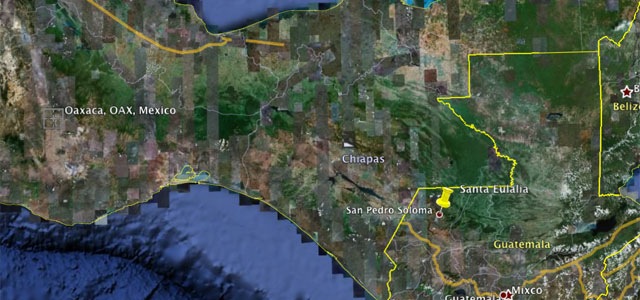|
|
Tuesday, June 2nd, 2009 at 4:06 pm
 When I signed up to come to Peace Corps, it was with the understanding that I’d get to put my skills to use. I’m an architect, I like to build stuff. When we got assigned to Rural Home Preventive Health, I understood that we’d be building sanitary infrastructure and teaching about health topics related to that. Unfortunately for me, they redesigned the program right before we arrived… going from 80% construction and 20% education, to our new approach of 10% construction and 90% education. The reasoning is sound; if people don’t understand how the technology works, they won’t know how to maintain it, or build their own…hell, they won’t even care that they have it. When I signed up to come to Peace Corps, it was with the understanding that I’d get to put my skills to use. I’m an architect, I like to build stuff. When we got assigned to Rural Home Preventive Health, I understood that we’d be building sanitary infrastructure and teaching about health topics related to that. Unfortunately for me, they redesigned the program right before we arrived… going from 80% construction and 20% education, to our new approach of 10% construction and 90% education. The reasoning is sound; if people don’t understand how the technology works, they won’t know how to maintain it, or build their own…hell, they won’t even care that they have it.  Because of this, there are a lot of latrines in our valley that are now chicken coops or tool sheds, because it’s more convenient to poop in the fields and they don’t realize that it might make them sick in the long run. Nonetheless, I was less than thrilled at not getting to build much. But now that we’ve been in our site a while, I am starting to get rolling on more construction projects. Because of this, there are a lot of latrines in our valley that are now chicken coops or tool sheds, because it’s more convenient to poop in the fields and they don’t realize that it might make them sick in the long run. Nonetheless, I was less than thrilled at not getting to build much. But now that we’ve been in our site a while, I am starting to get rolling on more construction projects.
A few weeks ago, I was approached by Marcos, one of the village leaders. He’s a quiet guy, and after an hour of conversation, it came out that he wanted help in constructing a new latrine. It seems the one he has now is pretty gnarly (wood-covered hole in the ground, like most around here), and is polluting the river to boot. Could I help him?
“Sure!” i said, figuring he was just fishing for a handout. Nope, turns out he really wants to do it bad enough that he is willing to buy ALL the materials, at personal hardship to him. He just doesn’t know how to make a sanitary latrine. Luckily, I am an expert.
You see, this is really a big deal, that he came for help like this. Many infrastructure projects in Guatemala are gifts of some rich international aid agency, and if you don’t have something to give the locals they won’t give you the time of day. This breeds complacency and a welfare mentality, and has ruined a lot of good communities in the past. Luckily (?), our community is pretty remote, so they’ve not been spoiled that way. Instead, the current “best practice model” is a percentage arrangement, where participating families have to kick in a certain percentage of the materials and all the labor, if they want to receive aid money. This gives them ownership of the project, so they value it more, and also fosters independence because they are shown how to do it themselves.
So, I agreed to help him, gave him a materials list, and figured I’d never hear from him again.
 Boy was I suprised a few days ago, when he came by my house and said, “OK, I have the stuff. Are you ready to start tomorrow?” This is the GOOD kind of suprise, though, so I cleared my schedule and we started on Friday with the concrete base. You see, he wanted the Cadillac of latrines. We do two types here: one is basically a hole in the ground, but sealed with a concrete pad and vent tube. It keeps the flies from moving in and out with their cargo of disease. But it fills up in 5 or 6 years, and has to be moved to a new hole. Boy was I suprised a few days ago, when he came by my house and said, “OK, I have the stuff. Are you ready to start tomorrow?” This is the GOOD kind of suprise, though, so I cleared my schedule and we started on Friday with the concrete base. You see, he wanted the Cadillac of latrines. We do two types here: one is basically a hole in the ground, but sealed with a concrete pad and vent tube. It keeps the flies from moving in and out with their cargo of disease. But it fills up in 5 or 6 years, and has to be moved to a new hole.
What Marcos wanted is the LASF, or Letrina Abonera Seca Familiar. That’s what you’re seeing in the drawing I made at the start of the post. It’s a composting latrine: in goes the poop, and 6 months later, out comes fertilizer. It never fills up. You never have to move it. It doesn’t contaminate groundwater. However, it DOES cost twice as much as the other kind, and the family needs some training on how to maintain it correctly. But Marcos couldn’t be dissuaded; he’s a practical man, and realizes that it makes more sense to spend the extra time and money now and do it RIGHT, rather than do it again in half a decade. I can’t believe he’s Guatemalan.
 Saturday we laid the blocks around the composting box. “Do we need to hire a mason?” is the question they always ask. Um, no… we’re building a shithouse, folks. It needs to be tight, strong, level- but doesn’t have to look professional. I can do that, and I can show them how to do that. Emily came by to help on Saturday; it always amuses them to see a woman building anything. Today we plastered the inside of the composting chambers, and later in the week we are going to make the formwork and pour the upper concrete slab. I will post pictures as things develop. Saturday we laid the blocks around the composting box. “Do we need to hire a mason?” is the question they always ask. Um, no… we’re building a shithouse, folks. It needs to be tight, strong, level- but doesn’t have to look professional. I can do that, and I can show them how to do that. Emily came by to help on Saturday; it always amuses them to see a woman building anything. Today we plastered the inside of the composting chambers, and later in the week we are going to make the formwork and pour the upper concrete slab. I will post pictures as things develop.
 For those of you at home who are interested, I want to do more latrine projects. I have already received a pledge from US Architects to sponsor one. My plan is to use whatever donations I can get to offset half the cost of materials for anyone in our village who wishes to make their home healthier with a “proper” latrine. Then, we will build it together. If any of you readers (or any of your friends/ relatives/ coworkers) are interested in sponsoring a sanitary latrine in Guatemala, email me at jfanjoy@hiddentower.com. Total material cost for a latrine is about $300, so by donating $150 you or your loved ones can help a Mayan family to help themselves. I will even get you pictures of your sponsored family. For those of you at home who are interested, I want to do more latrine projects. I have already received a pledge from US Architects to sponsor one. My plan is to use whatever donations I can get to offset half the cost of materials for anyone in our village who wishes to make their home healthier with a “proper” latrine. Then, we will build it together. If any of you readers (or any of your friends/ relatives/ coworkers) are interested in sponsoring a sanitary latrine in Guatemala, email me at jfanjoy@hiddentower.com. Total material cost for a latrine is about $300, so by donating $150 you or your loved ones can help a Mayan family to help themselves. I will even get you pictures of your sponsored family.
2009-6-27 Update: Marcos’s latrine is finished! Click HERE to see it.
Posted by: jfanjoy
Sunday, May 31st, 2009 at 6:49 am

I am an architect in “real life”, so I spend a lot of time looking at buildings. I can’t help it. Here in Guatemala, I see the strangest things- dangerous fire traps, unstable construction, hazardous electrical installations, unsanitary plumbing connections, and all types of ghetto-fabulous construction. I take pictures when I think I can get away with it, partly to amuse my architect buddies back home (especially Jerry) and partly in case I ever get a job teaching architecture again. You know, “Hey class, here’s a good example of what NOT to do…”
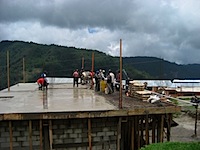
Here in my village, though, there really isn’t much to see. It’s mostly countryside, and a few mud brick houses. No running water, no HVAC, oftentimes no electrical. So when some guys showed up to build a concrete block house next door, I thought I’d pop over and see what was up. You see, concrete block is THE luxury building item here. There isn’t any wood (or drywall, for that matter) like in the US, and concrete block makes buildings with the same “feel” as the adobe bricks they’re used to. But it’s white-man material, so it’s better. So they say. Therefore, whenever an illegal immigrant sends money home, a block house gets built.
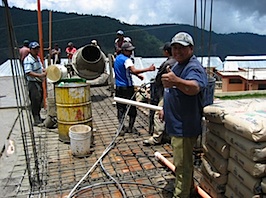 When I showed up with my camera to get a look, it caused quite a stir. These workers came from a town about two hours away, and didn’t know there were any gringoes in this valley. They were just starting their break, so Mathías, the foreman, threw me a soda from a big barrel and invited me to hang with them. “Can I come up on top?” I asked, and they were excited to show me the concrete terrazo they were building. When I showed up with my camera to get a look, it caused quite a stir. These workers came from a town about two hours away, and didn’t know there were any gringoes in this valley. They were just starting their break, so Mathías, the foreman, threw me a soda from a big barrel and invited me to hang with them. “Can I come up on top?” I asked, and they were excited to show me the concrete terrazo they were building.
As you can sortof see in the picture, the only piece of equipment they have is a gas-powered mortar mixer. That, and two dozen guys. “Camels!” the foreman yelled as break ended. Men swarmed up the ladders to lift the mixer and move it to another spot. Then, a big line of guys with buckets started hauling sand and gravel from a pile at ground level. Sacks of cement are stacked at the ready, and water comes from a few 55-gallon drums nearby. Everything gets tossed into the whirling mixer, measured by shovelfulls and bucketloads. Pretty basic. I saw this done once before with a bucket brigade, and caught a video of it. It’s here, and pretty fascinating to watch.
 “How thick is the slab?” I asked. Four inches. Hmm, how can that work? It spans about 20 feet, and is reinforced with #3 rebar at 8″ on center each way (you can click on these pictures to enlarge them). Sounds suspicious. I guess it must somehow not collapse, or else they would start doing it a different way after enough people got killed. Dude, we would get permanently reassigned to Lawsuit City if we built something this way in the US. And those roughsawn boards underneath the steel? That’s the formwork. Gaps larger than about a quarter inch are filled with crumpled newspaper to keep the concrete from all gushing out. “How thick is the slab?” I asked. Four inches. Hmm, how can that work? It spans about 20 feet, and is reinforced with #3 rebar at 8″ on center each way (you can click on these pictures to enlarge them). Sounds suspicious. I guess it must somehow not collapse, or else they would start doing it a different way after enough people got killed. Dude, we would get permanently reassigned to Lawsuit City if we built something this way in the US. And those roughsawn boards underneath the steel? That’s the formwork. Gaps larger than about a quarter inch are filled with crumpled newspaper to keep the concrete from all gushing out.
 God is in the details. Here’s an electrical box, I assume for the single bare-bulb light fixture that will illuminate the room below. The “conduit” is a piece of 1″ HDPE hose. Nice. Also, notice how two cross in a 4″ slab thickness. Sigh. Ya think they could have just moved that conduit over a few inches? God is in the details. Here’s an electrical box, I assume for the single bare-bulb light fixture that will illuminate the room below. The “conduit” is a piece of 1″ HDPE hose. Nice. Also, notice how two cross in a 4″ slab thickness. Sigh. Ya think they could have just moved that conduit over a few inches?
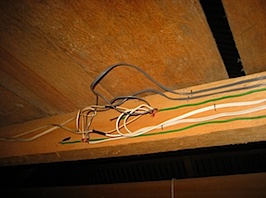 I guess I have no room to complain; I just rewired my house a few weeks ago. When we got here, we had one 50 watt bulb and one electrical outlet. Now we have three outlets, three different lighting circuits, and one effect lighting circuit. I am not sure my electrical panel will support much more expansion, though. 😉 I guess I have no room to complain; I just rewired my house a few weeks ago. When we got here, we had one 50 watt bulb and one electrical outlet. Now we have three outlets, three different lighting circuits, and one effect lighting circuit. I am not sure my electrical panel will support much more expansion, though. 😉
Posted by: jfanjoy
Friday, May 29th, 2009 at 5:44 pm
 The Peace Corps is invited by governments in need, to provide aid, and we are often sent to places that are “less than stable” politically. Since it’s inception in 1961, the Peace Corps has struggled with the danger of its volunteers being suspected of espionage. The Peace Corps works to dispell that image, for example, by barring anyone who ever worked for the CIA in any from Peace Corps service. For life. Government employees in other branches that might conflict are made aware of the situation as well, and are specifically trained not to solicit information from Peace Corps volunteers. This even trickles down to our daily lives: we can’t wear old fatigues, for instance, because that might imply a relationship with the military. The Peace Corps is invited by governments in need, to provide aid, and we are often sent to places that are “less than stable” politically. Since it’s inception in 1961, the Peace Corps has struggled with the danger of its volunteers being suspected of espionage. The Peace Corps works to dispell that image, for example, by barring anyone who ever worked for the CIA in any from Peace Corps service. For life. Government employees in other branches that might conflict are made aware of the situation as well, and are specifically trained not to solicit information from Peace Corps volunteers. This even trickles down to our daily lives: we can’t wear old fatigues, for instance, because that might imply a relationship with the military.
This sense of political caution also carrys over to what we say. We are STONGLY discouraged from any interaction with political groups, and we are barred entirely from making public policical commentary. This has a personal safety function, as well; sometimes political expression draws violence in the third world.
I am telling you all this to explain a change I made in the blog yesterday. Part of my job here (actually, it’s the third of the Peace Corps’s prime directives) is to share my experiences with Americans back home. As such, you read about my life as I see it. Occasionally, it’s disturbing, or uplifting, or confusing, or entertaining. I’m not a political person by nature, but every once in a while, my comments might be seen as political. With this in mind, I removed a few entries. I am strongly against censorship of any kind, but much like yelling “fire!” in a crowded theatre, this is a special case that could affect the safety of myself, my wife, or even my fellow volunteers.
My consolation in all of this is that Emily and I are thinking of writing a book about our experiences when we get back. Will it sell a single copy? Tzet xami! (who knows!) The book will, however, include the hidden passages as well as a lot more social commentary that might possibly be construed as “political”.
Posted by: jfanjoy
Wednesday, May 27th, 2009 at 1:37 pm
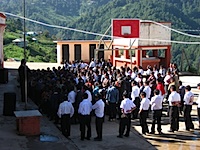 We’ve been saying all along that we need to work some in the schools, giving lectures to kids. Kids are the future of any society, and if we get to them early enough, we have a better chance of helping them to actually believe the health messages we are promoting- thing like “sickness is caused by germs, not cold drafts” or “washing your hands between using the toilet and eating dinner is a good idea”. So, after several discussions with the director and several cancelled appearances, today we finally gave our first lecture in the local school. “You better put on clean pants,” Emily joked, since mine bore some of the usual sprinkles of mud you get if you live on the side of a mountain in the Guatemalan countryside. I decided it was pointless, and just put on a clean shirt instead. Standards slide… We’ve been saying all along that we need to work some in the schools, giving lectures to kids. Kids are the future of any society, and if we get to them early enough, we have a better chance of helping them to actually believe the health messages we are promoting- thing like “sickness is caused by germs, not cold drafts” or “washing your hands between using the toilet and eating dinner is a good idea”. So, after several discussions with the director and several cancelled appearances, today we finally gave our first lecture in the local school. “You better put on clean pants,” Emily joked, since mine bore some of the usual sprinkles of mud you get if you live on the side of a mountain in the Guatemalan countryside. I decided it was pointless, and just put on a clean shirt instead. Standards slide…
We arrived a few minutes early, while recess was still on. It was total chaos: kids running around like there was a massacre happening, screaming and shouting. Of course, within minutes, we had a THRONG of kids encircling us, gawking and giggling and pointing. There were no teachers in sight. After a few minutes of making small talk with kids (what’s YOUR name?) the assistant director came up to talk with us. A split second before he arrived, I felt something hot and wet on my hand. I looked down to see that I’d been squirted all up my pants leg with some thick orangish liquid.
I was completely caught off guard. What the hell? I looked around, not sure if I should be pissed off or if it was some sort of weird mistake. All I got back was a wall of innocent looking faces. A second later (literally) the assistant director was shaking my sticky hand, and commenting on the fact that I was wearing hot sauce. He didn’t seem concerned, as though these things just happen at school. We were whisked away to a classroom, and the issue forgotten. I was glad I’d chosen not to put on clean pants.
We were greeted by 49 students, the two highest grades (5th and 6th) brought together to receive the wisdom we’d come to disperse. That’s the teaching methodology here, you see: neat chairs lined up facing the stage we were standing on, heads figuritively flipped open on hinged lids so we could pour knowledge inside, just like the teachers do. We were introduced, then 49 notebooks simultaneously opened and pens came to the ready.
Our teaching method is participatory, so the first thing we did was to get them out of their chairs and into a circle. Then we played some games that got them moving while simultaneously asking them about various health issues. After that, we returned to the desks and picked some student volunteers to help us with an interactive play about how a healthy family comes out ahead in the long run. They were all very hesitant (normal for kids) but seemed interested, and we even got a few smiles.
Then came the worst part: review questions. As Emily has complained before, it’s like pulling teeth to get the village women to respond to a question on their own. Getting one to voice her opinion in a group setting is impossible. We thought that with the kids it might be different; we were wrong. By the time they’re young teenagers, they’re already indoctrinated. No one speaks out here, no one asks questions here, no one LEARNS here. We tried every method either of us knows to eke a response out of them, and it was the longest half hour I can remember in quite a while. When we left, Emily was shaking.
I know, you’re probably thinking, “boo-hoo”. Dude, I’ve worked with kids before. I was a camp counsellor for three summers. Other PCVs had warned us about Guatemalan classrooms, but I still wasn’t prepared for what we saw. I keep thinking of Ryan, of Katie, of Mrs. VanAken- elementary teachers I know personally, people whose life work is to teach children how to learn, how to think, how to question…not just “pour knowledge into open heads”. Like so many times before, I keep coming back to how lucky we are as Americans. Our education system is far from perfect, but it’s light years ahead of so many others, if only for its philosophical approach.
Posted by: jfanjoy
Wednesday, May 27th, 2009 at 9:26 am
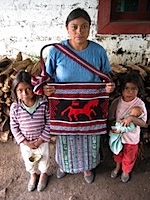
Emily’s work on Temux Mayan Artisans continues. She successfully contacted a fair trade distributor in the US, and is negotiating prices and quantities. We’ve also sold a few more bags through the Etsy store. Then, in a stroke of great luck, one of our fellow PCV’s dad offered to put up some front money to help stock some inventory. Thanks Len!
The next step is to crank up production, and hopefully start teaching the women some basic business management skills. I made them a website here, and the CordanYoungs offered to host it for us. Drop in and check it out! Feel free to pass it along to your friends, too. The more people that know, the better.
Oh, and we are thinking about offering custom designs. Ponder that.
www.TemuxMayanArtisans.com
Posted by: jfanjoy
Sunday, May 24th, 2009 at 2:22 pm
For most of you Mothers’ Day probably passed rather quietly, perhaps even pleasantly. Mothers’ Day was one was the first weekends we spent with our host families last May in the south, and it consisted of a fun Sunday meal at my host-grandma’s house. But this was in the ladino south, and I was curious to see how it would be celebrated here in Temux. It struck me as interesting that a culture sometimes notorious for mysogyny was celebrating a day of women, and I was curious to see how it would go down here. Truth be told, there was a get-together for all Huehue volunteers this weekend I probably would have chosen to go to rather than stay home, but our health comittee president had requested over a month ago that we be in Temux to celebrate Mothers’ Day with everyone. We like to be supportive, so we agreed to this.
A week or so before the big day Manuel told us he was going to gather money to create a “historical moment” in Temux. He invited the director of the school, the health center nurse, myself and Jaime, the three oldest chikays (grandmas) in town, and the town leaders all to a shared meal in the health center. He was so excited about this historical moment; “it’s about our sentiments, to show how we really feel about mothers, and to celebrate health and education on mothers day.” I was terribly impressed with his enthusiasm and how well he seemed to grasp the big picture of what’s important on this day, to him personally as well as to the town. He asked us if we could contribute to the meal and we told him sure. We told him our friend was coming for the weekend, and he said we had to convince her to stay and take part in the meal with us. He could hardly contain his excitement over the whole thing.
Sometimes I’m so surprised by our little village. In some ways it seems so unlike the Guatemala we heard about during training. Although I’ve mentioned before that the women seem to have been trained to be non-participatory and to not voice their opinions, I have never seen physical signs of abuse or heard horror stories of that nature in Temux. There is a definite gender divide with some obvious inequalities, but while working to encourage confidence in these women, I just kept thinking, “You know, it’s really not that bad, all things considered.” Ironically, Mothers’ Day, with its wordy plaudits to Virgin Mary and images of caucasian mothers with their white babies plastered in red hearts hanging from the ceiling as decorations, was quite the eye-opener.
Our friend Emily came in on Friday, and was welcomed by the town leaders who were in a meeting trying to set up our Emergency Action Plan. She was the subject of three impromptu applauses within 15 minutes. On Saturday we decided to show her the paisaje and go for hike, where we were intercepted by what seemed like half the town, but we had one particularly interesting interaction. One of the town leaders stopped us to ask us, on behalf of his wife, a little question that he had. It took him nearly 10 minutes to spit out this question, on behalf of his wife. It turns out they have a son in the US who was arrested for statutory rape and sentenced to 35 years in an Arizona prison, but in the last 3 months no one has been able to contact him, and he’s stopped writing letters. They’re concerned about where he is and if he’s ok. The question from this mother, “Is there anything you could do to help us find out if my son is ok?” I just happen to have a cousin who is an immigration lawyer. I told them if they gave me his name and information I could contact my cousin to see what we could do, but I could make no promises. They told me they had two other sons working illegally in the US and they’d have one call me to tell me the whole story if I wanted them to. I left my number with the family to pass along to their sons.
We continued on our walk talking about the case. Supposedly the guy was 21 and his girlfriend/mother of his child was 15. Her parents did not press charges, but they told the guy he had to be responsible for his child and take the girl to her medical appointments, but somehow the case was found out and the guy was arrested anyway. This seemed a really unfortunate, because that’s a fairly standard relationship here. So this boy gets to the US, and is acting under what he views as pretty “normal” circumstances, and he lands in an American prison for 35 years? That sentence seems incredibly harsh, so we wonder is this a typical story here where some detail we’d deem very important was just left out? Who knows… But we do know that the way things work here, boys don’t have a lot of responsibilities. I feel because of this they’re generally very immature. In my opinion/experience, a 21 year old rural Guatemalan male does not have the maturity or life experience of a 21 year old American guy, and we tend to view 21 year old guys in the US as pretty immature in their own right. On the other hand, a Guatemalan girl is handed a mountain of responsibilities as soon as she’s old enough to start participating, about the age of 6 or 7. By the time the girls here turn 12 they can run a household nearly as well as their own mothers can, which I guess is good since they often end up becoming mothers themselves in the next year or two. So if you look at this statutory rape case from the US through the Guatemalan cultural lense it seems unfair that he was ever charged for anything.
Please DO NOT mistake this as me supporting teenage pregnancy; I would rather it not happen anywhere, and we do teach the health risks of such early pregnancies in our health talks. But the fact is that in many countries around the world teenage pregnancy is the norm, not the exception. I’ve read some essays and critiques that charge American culture with inventing “adolescence”, a time of learning and experiencing life without the burdens of having a spouse or children to take care of. Thus in Guatemala and many other countries teenage pregnancy is not treated as a problem to be eradicated like we treat in the US because the innocence of adolescence we’re trying to protect doesn’t always exist in other cultures. Turns out the missing piece of information was that the girl was 12 year old, and the case was reported by the clinic she went to for prenatal care. Twelve was a lot harder for me to stomach, but still falls into the bounds of normalcy here. In this story we have one mother suffering because she doesn’t know where her son is or if he’s alright, and another much younger mother who’s left alone to raise her child as the babies father is in jail. We are trying to locate the guy with the help of my cousin, just to see if he’s alright, to give the family some peace of mind. Happy Mothers’ Day?
Enter Sunday, the BIG DAY. Bombas began to go off as early as 4 am, huge jarring explosions and marimba music was broadcast over the loud speakers in the center of the village. Happy Mothers’ Day! I am glad on, so many occasions, that I sleep in ear-plugs. By 8 in the morning we watched from our window, a bustling school yard, kids in their school uniforms on a Sunday, everyone scrubbed clean and dressed in their nicest clothes. The teachers, most of whom live in town, had come out to the village to lead the ceremonies, children presenting little skits of thanks and celebrations to their mothers. It appeared to be a very happy affair from our little window. Generally on big celebration days like this we stay away all morning to have to some personal time and gear up for a long afternoon and evening of cultural exchange. That’s how we played it on this Sunday morning, even more so because Emily was visiting us. We spent the morning debating whether she’d go home or stay for the party as had been requested, and finally we talked her in to staying one more night. I called Manuel around noon to make sure the plans were all in order for the party/ meal in the health center we’d heard would start at 3. His wife answered the phone, which is always awkward for me because she doesn’t speak Spanish very well, and I don’t speak Q’anjob’al very well, but eventually I got her to pass the phone to him. He was slurring drunk. When I asked about the meal he said, “Oh, we’re not doing that today, all the leaders are drunk.” So much for historical moments, and expressions of profound sentiments. Happy Mothers’ Day.
We decided we’d run into the Sunday market since Emily was staying an extra day and we were no longer having food provided for us in the afternoon. When we got back we had all the ingredients to make a cake for all the mothers in our host family, except sugar. I ran down to the store, and found it filled with cigarette smoke. Manuel was buying beers as his wife stood by his side, like she was shielding him from people, making sure he didn’t do or say anything too regrettable. I glanced in the back corner and saw that most of the male school teachers as well as a few local guys, squinty-eyed,leaning on one another and the stacks of soda crates for support as they downed drinks together. This store is located right across the road from the school. Kids were running in and out all day. I couldn’t help but think what wonderful examples they were setting for the kids. I returned to hide in my house and bake a cake to share with our favorite local mothers.
We’d purchased a little gift for Lina, Nas’ wife, to present along with the cake, and around dinner time we went over to the house to share with them. Thankfully, as is usually the case, Nas was completely sober and had spent the day relaxing with the family as did some of our other favorite town leaders. I told the Lina, Reina, Gela, Masha and Lena that, being the moms, they got to decide if they wanted to eat the whole cake themselves, or if they wanted to share with their kids. They laughed, very amused. That would be so unlike them here. EVERYTHING in that house is always divided into fair parts for sharing, and the mothers last of anyone would ever imagine keeping bigger pieces for themselves, but they played along laughing and said they’d eat it all themselves, to the protests of the kids who wanted in on the cake. Then we split it into 20 some pieces and dished it out to everyone as custom dictates. Earlier in the week we’d told the whole community that we’d come out to dance the marimba with them and dress in the traje, so the family began dressing the Emilys after we finished the cake, and off we went to the marimba.
Dressing up and dancing with them is such a little thing to us, but people get so excited to see us out and dressed. Their excitement has become our biggest reason for doing it. They feel like we respect and support their culture, and they always tell us that we’re so good at dancing to the marimba! Sometimes I wonder if we’ve fooled them into thinking we like the marimba as much as they do. But I don’t think it’s possible for anyone to like marimba as much as they do. Their unwavering devotion to marimba is something else. But we danced and danced 4 or 5 sets. The little girls danced with Fletch while a few local guys asked me to dance (and the rule we’ve devised is that Jaime “doesn’t allow” me to dance with anyone who is drunk), and Emily took turns with various women and guys. Drunk men stumbled in and around the circle, falling down and coming up covered in dust. Emily is a photographer and told us that once she asked if she could photograph a dance in her town. The town leaders told her she could, but only if she came early in the day, because at night people started dancing with all sorts of partners and if she took incriminating pictures that made it back to the US, then there could be problems. Have we mentioned that this dance involves standing side by side, men keep their hands clasped behind their back, and the women keep their hands straight down at their sides. What kind of incriminating photos could be taken of this dance?! If that doesn’t speak to the conservatism of this culture, I don’t know what does. That is also the reason that lots of women end up dancing with their sisters or sisters-in-laws or no one at all. In the case of all our host sisters, whose husbands are all in the US, they come to the dance simply to watch since they can’t safely dance with anyone without starting rumors. So they and lots of mothers sat along the walls watching on, as we danced set after set in circles, and maybe they had the easier lot since the women whose husbands are here spent much of the evening taking care of the inebriated spouses. Happy Mothers’ Day.
I was glad when we finally came home to settle in for the evening. I was feeling pretty down about the whole thing, but relieved that it was over. Turns out it wasn’t. Monday morning after Emily left I went to visit the kitchen and chit chat with everyone. When I walked in a man I didn’t recognize was passed out on the floor. They’d thrown a blanket on top of him. Everyone seemed to be largely ignoring his odd presence there, stepping over and around him. The grandma came in to take her seat in the corner by the fire as he began to wake up and thrash his legs about. Mind you, she’s nearly blind and walks with a cane, but even so it took two other people to guide her around his thrashing legs and help her to her seat as she squealed, “Ay!Ay!Ay!” Annoyingly, he saw me and tried to begin speaking English, and then I tried to ignore him like everyone else did. As he came to, I took leave of the house, but he was there all day. Every time I went over to get water or to wash dishes, he was ranting and raving, kicking the dogs around, scaring the kids.
Reina told me later that he was a cousin and they kept him at their house because he’d end up beating his wife he went home. “He keeps telling my dad he wants more kids”. I asked her how many kids he has. “Mmm, I think he has 8 or so. The worst part is that his oldest son had to drop out of school when he was deported from the U.S., and he only had half a year to go before he finished nursing school. So me and Rigo (her brother) and my dad are all paying for him, it’s a loan he’ll pay back, to finish school so he can at least find a job. And here his dad is completely drunk. He beats his wife if he thinks she’s not getting pregnant fast enough, and he tells her he’ll leave her if she doesn’t keep having babies, but he can’t even pay for the ones he has.” I felt slightly ill. We finished up talking and I went home.
Later in the afternoon Fletch and I were working in the greenhouse when Masha came by to check out what we were doing. Michelle was strapped to her back, she told me, because she was scared of the bolo (drunk guy) at the house and didn’t want to be without her mother. But she wanted to inform us there was a muerto, someone had just died. She doesn’t speak much Spanish, so we didn’t get the story from her. Reina stopped by about 15 minutes later to tell us the same thing, and I asked her what happened. “It’s a guy who hung himself. Did you see him stumbling around this morning? I saw him down on the road. He just got sent back from the U.S. by his dad who said he was drinking too much. He’s had problems since he got back. They said he was using cocaine in the states. Last night he was so drunk he started hitting his wife and trying to strangle her, but his uncle stepped in to defend her. Then he started hitting his uncle. They don’t live here, so when morning came his wife took their baby and went back to their home town. He was staying at his grandma’s house, and they had someone watching him all morning. He told the guy watching him that he was going to sleep so the guy left. When he was alone, he hung himself with a cord.” This guy was only 19 years old, so who knows how young and terrified his wife was. So at this point I was wondering, would this awful saga of Mothers’ Day ever end!?
The mother of the deceased had come to get the body and the town leaders convinced her not to take it out of town, rather to bury him here. Apparently if they moved the body from here to his home town there would be an investigation of his death and no one wanted to mess with that. That meant we listened to two days of funeral music coming from his grandma’s house up the hill until they finally buried him on Wednesday. And believe it or not, I was privy to even worse stories of abuse in the interim, as though this death brought up a bunch of dirty secrets everyone needed to whisper to get off their shoulders. I was disturbed and depressed.
You know, it’s not that these thing don’t happen in the U.S. They do, and it’s just as disgusting and awful that they happen there. But we have recourse for perpetrators of such violence. We have safe houses for abused women. We have laws and police officers who enforce them. That doesn’t mean that all bad-deeds are punished. But it does mean that such violence and abuse aren’t accepted as common place and/or due course for domestic disputes. Mothers’ Day and the week following shook my faith in the possibility of progress here. A community, a state, a nation, a world, CANNOT develop if they subject half their citizens, to inferior status. The men here are given so little responsibility, and yet they’re given responsibility for everything, without being held accountable to anyone. What is incentive for them to change? It’s a problem that affects everything we’re trying to do here. I find it even more troubling how this is the case in a community where religion is used to explain everything. Where in their religion do they find justification for acting this way? I find myself losing more and more respect for religion here. But at the same time, I think if there’s anything males here will respond to it is the Church. So I began to wish there was some way these churches could begin educational campaigns to teach men how to be responsible fathers/husbands/members of society in general. I don’t know what we could do to foster that, but I keep thinking about it. This problem is just so huge. It’s taken me a while to digest all this information and in turn to be able to write about it.
Thankfully, the end of this awful week coincided with our first weekend out of site in almost a month. I was ready to run away for awhile. It helped to have a weekend to talk to people who understood where I was coming from, to put some perspective and distance between myself and these events. And I didn’t run away for good. Here we are back at work again, and there is plenty of work to do.
Posted by: emily
Sunday, May 24th, 2009 at 9:57 am
 Tuberculosis is a pretty nasty disease, even nowadays. If you get treated correctly, you won’t die, but the treatment is onerous- 9 months of solid medication, and during that time you can’t drink alcohol or caffeine. This is what Nick, our buddy and fellow Peace Corps Volunteer, just found out. He’s finishing his service this week, and as part of the exit medical examination, they run a TB test. Turns out, he’s positive (but asymptomatic). What a nasty thing to pick up in a third-world country! My dad had a friend that got asymptomatic TB when he was in the Air Force, and it basically wrecked this guy’s career because it took him off of flight status for over a year, even though he felt fine. That is a funny coincidence to me, because Nick (my friend) and Tony (Dad’s friend) are the two biggest people I’ve ever met. Nick was more fortunate than Tony, though; Peace Corps is allowing him to extend service to a third bonus year, and transfer to China. I guess the Chinese government is more forgiving of that sort of thing? Nick won’t be flying airplanes, though. Tuberculosis is a pretty nasty disease, even nowadays. If you get treated correctly, you won’t die, but the treatment is onerous- 9 months of solid medication, and during that time you can’t drink alcohol or caffeine. This is what Nick, our buddy and fellow Peace Corps Volunteer, just found out. He’s finishing his service this week, and as part of the exit medical examination, they run a TB test. Turns out, he’s positive (but asymptomatic). What a nasty thing to pick up in a third-world country! My dad had a friend that got asymptomatic TB when he was in the Air Force, and it basically wrecked this guy’s career because it took him off of flight status for over a year, even though he felt fine. That is a funny coincidence to me, because Nick (my friend) and Tony (Dad’s friend) are the two biggest people I’ve ever met. Nick was more fortunate than Tony, though; Peace Corps is allowing him to extend service to a third bonus year, and transfer to China. I guess the Chinese government is more forgiving of that sort of thing? Nick won’t be flying airplanes, though.
side note: I just spoke with the PCMO (Peace Corps Medical Officer) and she says that before HIV, tuberculosis and malaria were always “…neck-and-neck to see which was the most common infectious disease in the world.” Last year, Peace Corps Guatemala had 8 volunteers come up positive for latent TB. That works out to about 4% of us per year.
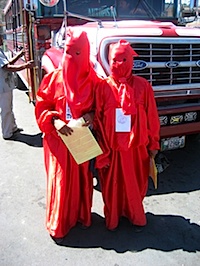 <<a href=”http://www.JFanjoy.com/blog/wp-content/uploads/2009/05/huehue-garbage.jpg” target=”photo”> <<a href=”http://www.JFanjoy.com/blog/wp-content/uploads/2009/05/huehue-garbage.jpg” target=”photo”>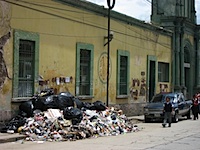 The closest “city” to where we live is the departmental capitol, Huehuetenango. We joke that it’s like Dodge City in the wild west days- when you get to the dusty bus terminal, it’s a carnival of people, livestock, stagecoaches (ok, buses) and it always feels like a gunslinger is going to call someone out. They have a crooked mayor (like every Guatemalan city?) and the word on the street is that he’s stealing so much money from the city that they can’t even pay the trash collection bill. At least, that is what these student protesters are going on about, amongst other things. True or not, the trash isn’t getting collected, as seen here in this picture I took walking to the grocery store. Stinky! So what do you do? Well, if the students handing out handbills aren’t getting the job done, there are intermediate steps before an all-out civil war. The next one for us is riots and setting police cars on fire. Let’s not get hasty, here! The closest “city” to where we live is the departmental capitol, Huehuetenango. We joke that it’s like Dodge City in the wild west days- when you get to the dusty bus terminal, it’s a carnival of people, livestock, stagecoaches (ok, buses) and it always feels like a gunslinger is going to call someone out. They have a crooked mayor (like every Guatemalan city?) and the word on the street is that he’s stealing so much money from the city that they can’t even pay the trash collection bill. At least, that is what these student protesters are going on about, amongst other things. True or not, the trash isn’t getting collected, as seen here in this picture I took walking to the grocery store. Stinky! So what do you do? Well, if the students handing out handbills aren’t getting the job done, there are intermediate steps before an all-out civil war. The next one for us is riots and setting police cars on fire. Let’s not get hasty, here!
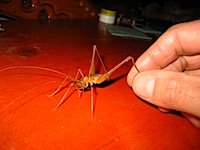 Back at home, we continue to find more interesting bugs. We were sitting sround the wood stove talking to one of the neighbors when Emily said, “Look at the size of that thing!” It wasn’t the Death Star (awesome quote), it’s was the biggest cave cricket I’ve ever seen, meandering across our floor. His legs were a good two inches long. Here he is, seconds before I threw him out for drunk and disorderly conduct. Back at home, we continue to find more interesting bugs. We were sitting sround the wood stove talking to one of the neighbors when Emily said, “Look at the size of that thing!” It wasn’t the Death Star (awesome quote), it’s was the biggest cave cricket I’ve ever seen, meandering across our floor. His legs were a good two inches long. Here he is, seconds before I threw him out for drunk and disorderly conduct.
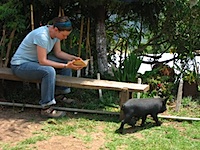 Speaking of home, one of Emily’s favorite things to do is read. Luckily, that is something she can continue to do in Guatemala. Books are expensive here, but all the Peace Corps volunteers trade books all the time, like an informal book club. Here’s Emily reading in the sun in our front yard, with a friendly piglet that happened by. Speaking of home, one of Emily’s favorite things to do is read. Luckily, that is something she can continue to do in Guatemala. Books are expensive here, but all the Peace Corps volunteers trade books all the time, like an informal book club. Here’s Emily reading in the sun in our front yard, with a friendly piglet that happened by.
 Our greenhouse continues to grow. The watermelon, cantaloupe, and pumpkins are growing really quickly, and amaze all comers. The tomatos are slower going, but are starting to make a strong show and I need to get them staked in the next few days. The cucumbers are so-so; a lot of them never sprouted. That’s sad, because cucumber is one of my favorites. We never even got sprouts for the peas, most of the beans, the oregano, the chilis, or the spinache. Hmm. Learning curve, I guess. I re-tilled those spots, and replanted with red onion and broccoli (which grows better in cold, and will get moved outdoors once it sprouts). But every other day, someone new comes by to oooo and aaaah about the stuff in the greenhouse. Our greenhouse continues to grow. The watermelon, cantaloupe, and pumpkins are growing really quickly, and amaze all comers. The tomatos are slower going, but are starting to make a strong show and I need to get them staked in the next few days. The cucumbers are so-so; a lot of them never sprouted. That’s sad, because cucumber is one of my favorites. We never even got sprouts for the peas, most of the beans, the oregano, the chilis, or the spinache. Hmm. Learning curve, I guess. I re-tilled those spots, and replanted with red onion and broccoli (which grows better in cold, and will get moved outdoors once it sprouts). But every other day, someone new comes by to oooo and aaaah about the stuff in the greenhouse.
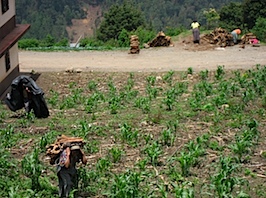 More firewood came two days ago. This is good, as the cold has returned, and we went without for a few weeks. Thing is, firewood is sometimes hard to come by. We had promises from a few leña (firewood) vendors to bring some, but they never showed up. “All firewood sellers are liars,” Lina told us. Yep. Anyways, Nas Palas finally found a good deal from a guy that owed him a favor, so he bought a truckload- literally. We pitched in a huge chunk of our monthly income to get two tareas to last us a while. We don’t use a lot of firewood, but going without is annoying. How big is a tarea? I am not exactly sure, it’s some cryptic quantity that is an armlength by waist high by a certain length. Tarea literally means “work”, so maybe it’s also the amount of work a woodcutter should do in a day? Anyways, we now have a stack about 20 feet long and waist high. We’re good to go. The trick is that the truck dumped this mountain of wood (our two tareas, plus six for Nas Palas’s family) at the bottom of the hill. Nas came up to me, and explained that he was paying his sisters-in-law to carry it up the hill and stack it at the houses, since he had to work the fields all day, and we should probably do the same. Nas is the ONE legit person in town I trust, so I figured he was right- not only because we were scheduled to be in meetings all day, but because the last time I carried wood, it about killed me. So, yeah, we paid a team of Guatemalan women the equivalent of $7 to carry our wood up the hill. Part of me feels guilty/ lazy, but the reality of it is that they did a better faster job than I would have, and they’re desperate for some work. That $7 is two full days of paycheck here. More firewood came two days ago. This is good, as the cold has returned, and we went without for a few weeks. Thing is, firewood is sometimes hard to come by. We had promises from a few leña (firewood) vendors to bring some, but they never showed up. “All firewood sellers are liars,” Lina told us. Yep. Anyways, Nas Palas finally found a good deal from a guy that owed him a favor, so he bought a truckload- literally. We pitched in a huge chunk of our monthly income to get two tareas to last us a while. We don’t use a lot of firewood, but going without is annoying. How big is a tarea? I am not exactly sure, it’s some cryptic quantity that is an armlength by waist high by a certain length. Tarea literally means “work”, so maybe it’s also the amount of work a woodcutter should do in a day? Anyways, we now have a stack about 20 feet long and waist high. We’re good to go. The trick is that the truck dumped this mountain of wood (our two tareas, plus six for Nas Palas’s family) at the bottom of the hill. Nas came up to me, and explained that he was paying his sisters-in-law to carry it up the hill and stack it at the houses, since he had to work the fields all day, and we should probably do the same. Nas is the ONE legit person in town I trust, so I figured he was right- not only because we were scheduled to be in meetings all day, but because the last time I carried wood, it about killed me. So, yeah, we paid a team of Guatemalan women the equivalent of $7 to carry our wood up the hill. Part of me feels guilty/ lazy, but the reality of it is that they did a better faster job than I would have, and they’re desperate for some work. That $7 is two full days of paycheck here.
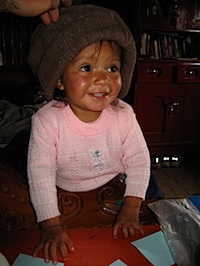 We will finish up with a “cute native kid” picture, mandatory in all Peace Corps work. This is Delmi, daughter of Regna, Emily’s buddy. She comes to our house sometimes to visit. Originally, this was a good thing, since she could crawl freely on our wooden floor instead of everyone else’s mud floor. But she started walking last week, so now she toddles over, knocks on the door, and stumbles in when we open it. She likes to play with Emily’s stuff, too. Here she is, wearing Emily’s hat. We will finish up with a “cute native kid” picture, mandatory in all Peace Corps work. This is Delmi, daughter of Regna, Emily’s buddy. She comes to our house sometimes to visit. Originally, this was a good thing, since she could crawl freely on our wooden floor instead of everyone else’s mud floor. But she started walking last week, so now she toddles over, knocks on the door, and stumbles in when we open it. She likes to play with Emily’s stuff, too. Here she is, wearing Emily’s hat.
Posted by: jfanjoy
Wednesday, May 20th, 2009 at 10:34 pm
Well, we finally got the story on Marci’s ailment. As we’d guessed/feared, her appendix was swollen and about to rupture. Untenable pain in the lower right abdomen can be other things, but this is the worst possibility here in the remote villages, because people are hesitant to go to the hospital. There’s not enough money, the bus trip is too long, their entire 50 person extended family can’t be with them in the waiting room, things like that. So, they suffer through it, then suddenly the pain goes away (because it burst) and they think everything’s OK. By morning, they’re dead.
In this case, Marci was in so much abdominal pain that she was vomiting uncontrollably. Her uncle (who we like and is normally really with it) was boneheaded and said, “She complains all the time; you shouldn’t take her to the hospital just for that. It will pass.” Then the family did what any good Guatemalan would: they broke out the candles, and started an all-night prayer vigil. Unfortunately for Marci, she was obliged to participate. A few hours into it, her mother looked up, figuring Marci must be healed since the complaining had stopped. Nope, Marci had just passed out.
“She’s going to die!” her aunt said. Her niece heard, “She’s dead!” and ran screaming to the health center to proclaim the news, that the fourth villager this month had passed away. The nurse Lucia and our buddy Manuel (president of the health committee) were there at the time, along with a heap of drop-in patients, and everyone poured out of the center to see what was going on. When they arrived at Marci’s house, the nurse saw that she was indeed still alive but in a terrible way, and they got someone in the village with a pickup to take her into town to see the closest doctor. He, in turn, sent her straight away to the public hospital in Huehuetenango, 4 hours away. We STILL don’t even have an ambulance in the main town, so they talked one of our three Policia National Civil officers (sortof like our FBI) into taking her. Surgeons operated that evening.
So, she lives, mostly by luck. Life is hard in Guatemala.
Switching topics slightly… by now, most of you have heard of influenza H1N1, or the “Swine Flu”. It’s already killed a few hundred people in several different countries, and there is a lot of hype about how it may become a serious pandemic. Even though the whole thing started next door in Oaxaca Mexico, I personally am not really worried about it. People don’t travel a lot here, and we don’t get many visitors.
Guatemalans DO watch the news, though, and they are somewhat concerned, even though there is only one confirmed case so far in the whole country. And there is a lot of misinformation here, just like in the US: the first day the news broke out, not a pound of pork was sold in the entire Huehuetenango market, even though the disease cannot be passed by eating pork. Since we’re the local health workers and pseudo-celebrities, we were asked to do a presentation on how to avoid influenza H1N1.
The venue was the regional council’s finance meeting, a good choice because over 100 people show up, with at least one represenetative from each community in the region. We were the “opening act”. Since we hate to put people to sleep, we usually throw in some pretty silly stuff. During Emily’s opening comments, I start sneezing, and then sneeze right on her… with a handful of flour over my mouth, so it sprays all over her. Hilarious. We also coat our hands with red glitter before the lecture, and shake hands with as many people as we can before we start. About halfway through the lecture, we explain what germs are, and ask the audience to look at their hands. Most can find glitter in the cracks of their hands, and by halfway through the lacture, many even have it on their faces. It illustrates how germs can pass so easily from one person to the next, getting into your mouth and eyes, making you sick.
Everyone likes to laugh at the gringoes, but these things get them to relax a little and listen. Thing is, the lecture contains nothing new; you prevent Swine Flu the same way you prevent most transmittable diseases: wash your hands. Sure, not sharing lollipops or sodas and covering your mouth when you sneeze, they help too, and we discuss them. But the handwashing is the big one, and they always need to hear the message again.
Posted by: jfanjoy
Monday, May 18th, 2009 at 6:55 pm
Sometimes Emily and I get asked to throw in our two cents on local issues. This might be because we’re funny, or because we’re the only college graduates within hours of here, or because we’re the village mascots, or because we’re gringoes… or maybe just because they’ve come to trust us. The jury’s still out. Anyways, last week I sat in on a meeting about the Plan de Emergencia (Emergency Action Plan) that the health committee is trying to get everyone to support. The idea is that everyone in town pitches in some money, so that if someone has a critical illness or accident, they can pay someone to take them to the hospital. This is a great idea, seeing as how we have no ambulance in town and the closest hospital is about 5 hours away in Huehue. And we know the need is there, as we just buried someone a few weeks ago who died of a pretty preventable problem.
Since Emily wasn’t there (she was giving a lecture that got scheduled at the same time), I had to do the talking to represent Team Fanjoy. They asked me to get up first, and make some pithy remarks to kick off the meeting and fire up the populace. I have gotten better and a little more confident at my Spanish, but I still feel like I’ve got a long way to go. Here’s what I said, as best as I can rememeber it:
Trajehin heq’ hemasanil, hex wanab’, hex wustaq. (that bit is in Q’anjob’al)
Como ustedes saben, Emily y yo somos nuevos aqui. Por eso, podemos ver algunos ventajas que tienen ustedes. La primera es sus recursos: en este comunidad, hay mextol y enfermeras, también un doctor, Q’anjob’alense. La segunda vantaja es sus líderes. Son amables, inteligentes, y quieren ayudar a la gente. La tercera es lo mejor: ustedes tienen la voluntad y fuerza a mejorar sus propios vidas. Pero hay una cosa que ustedes no tienen: el apoyo de su propio gobierno. Por favor, no esperen en extranjoeros o Alvaro Colom a dar dinero o ayuda a ustedes. Hay un dicho: Dios ayuda a la gente que ayuda a su mismo y su vecinos. Espero que ustedes apoyen al Plan de Emergencia. *translation follows at the end of the post
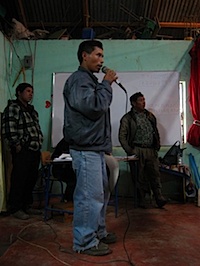
Afterwards, various people got up and said their bit. I could only follow a small part of it, as the meeting was in Q’anjob’al. But I understood the gist of this guy’s message: “Why”, he asked, “are we so afraid to give 10q each for this plan, yet all of you gave 10q last week to the family of the guy that died? Does it make sense to let people die, yet still pay the same? I’d rather pay it first, and see my brother or sister live.”
Most of the other speeches were along similar lines. All the big names in town weighed in: Nas Palas, who always speaks emphatically and everyone respects a heap; Don Ximon, whose speaks quietly and slowly but is never interrupted; Manuel, who has a silver tongue that beguiles the populace; Don Tomax, who is the head of the town development board. Even younger guys got up in support of the plan. Hopefully their passionate appeals did some good.
Then, two days later, the first case-in-point came. Emily and I were woken up at 3:45 by a desperate call from our friend Luky. Her sister Marcie was having terrible pain in her abdomen, and vomiting uncontrollably. Emily knew from previous discussions with Marci that she’s had abdominal tumors before, but who knows what this could be? “Take her to the hospital,” Emily told her groggily.
“I can’t!” Luky moaned. “We don’t have any money!”
Well, there you have it. “Call Manuel,” Emily advised her. “That’s what the emergency plan is for.” We know there is already a little money in the fund, as they’ve been collecting a quetzal per person at our health lectures.
“I called him, and he’s not answering,” she replied. Hmm. So, we pondered some, and we all eventually decided it would be best for her to send her brother on foot to rouse the sleeping Manuel.
We left for our meeting in the south about 3 hours later, and didn’t find out how it all turned out until we got back to our village today (since no one would return Emily’s calls). Manuel came by and told us that they took Marci to the national hospital in Huehue on Friday, she was there for a few days, then returned today (Monday). We’re going to go by and visit her tomorrow, to find out what really happened.
~~~~~~~~~~~~~~~~~~~~~~~~~~~~~~~~~~~~~~
And here’s the English translation of my speech:
Good afternoon, my sisters and brothers. As you all know, Emily and I are new here. Because of that, we can see some advantages that you have. The first is your resources: in this community, there are teachers and nurses, even a doctor, who are native. The second advantage is your leaders. They are friendly, intelligent, and want to help the people. The third is the biggest: you have the will and strength to make your own lives better. But there is something that you don’t have: the support of your own government. Please, do not wait on foreigners or the President of Guatemala to give you money or aid. There’s a saying: God helps those who help themselves and their neighbors. I hope that you all support this Emergency Action Plan.
Posted by: jfanjoy
Thursday, May 14th, 2009 at 6:02 am
Hello everyone! We’ve finally managed to stay in site for almost an entire month. We thought maybe it would slow down the pace of life a little bit, but we found it did not really at all. Time is still flying by. Oh how quickly the month has disappeared. We’re leaving our village again tomorrow morning for a trip to Panajachel, meeting up with some representatives of different aid organizations to exchange ideas and look for possible economic support for second year building projects. It should be fun. Personally I love being on the road alternating between reading my current book and watching the scenery fly by. My perspective on travel here has changed dramatically, as I used to dread it. It felt so full of hassle and stress, but now we know the ropes, and it’s all pretty easy as long as we’re not dumb. It also helps that there are two people, because one of us can be dumb (or asleep) while the other stays alert. But anyway… we’re also going to meet some new-to-us Americans. As proven with our translating venture with the Cascade Medical team, meeting up with non-Peace Corps Americans here is often fun, as it’s both a taste of home and a time full of new-to-us stories and ideas. So it should be good. BUT, I made it my goal to write another post before we leave on Thursday morning, so here’s what we’ve been up to:
I’ve begun to feel a little like we’re home-steading here. I mean, we’ve got the chickens, the greenhouse, Fletch is working on natural stone steps down to our latrine. We’re working on plans to replace our current stream-polluting pit latrine with a composting latrine, and also plans for building a smokeless chuj near the house both for our personal bathing needs and as a teaching tool for the locals. Finally, we’ve just begun efforts to make a sweet loft space in our house. We talked about this about 7 months ago, decided it could be fun, then forgot about it. I guess we were just busy with other things. But we’d had 3 visitors, the space had been tight, and a fourth one was on the way, so we decided we should do this thing. It’s great because it also means we can both be home and not HAVE to see each other every second of the day. This is helpful to our inner peace as well as our mutual appreciation of each other. 🙂 It’s currently a space with a mattress for sleeping and it has lighting. Miman Emily said it was comfy to sleep there. She was sortof obligated to say that in front of our host family since they were aghast that someone would be forced to sleep up there. They thought we were pretty bad hosts. B ut we want to make it into a type of loft-living room. So, we’re busy, as-per-usual.
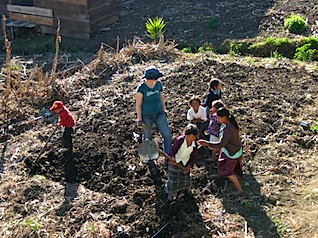 The greenhouse has been kind of a fun, exciting personal project. It’s as much a learning tool for us as it is for the rest of the community. From the very beginning other people have been involved. I think it’s funny that whenever the girls see me out working, they immediately want to come help. This was back at the beginning of the project. At the time I was worried about their tiny feet in flimsy sandals ending up under the hoe, but thankfully that never came to pass. Now we run garden tours at recess for the kids that come to our door asking to see what’s inside. The school is just across the road from our house. Anyway, the other day I was in there in my rubber boots with the water hose, letting the ground have it as the sun went down. I was thinking, ya know, we’re sort of “Hippy Farmers” in the derogatory sense of the title. As in, ohh we love the earth, ooh we love to plant and watch the seedlings grow and turn into our food, Man…But we don’t really have a clue what we’re doing. However, unlike “Hippy Farmers” we do know how to use our resources and figure things out, so hopefully this will turn into a more successful experiment than the now defunct 1960’s organic food “Hippy Farmer” ventures…hopefully. 🙂 We do listen to all the advice of our Mayan farmers who’ve been living on this land for as long as they can remember, so we’ve got that going for us. Between them, Joel Salatin, and the internet, we hope to eat some of the food we’ve planted. The greenhouse has been kind of a fun, exciting personal project. It’s as much a learning tool for us as it is for the rest of the community. From the very beginning other people have been involved. I think it’s funny that whenever the girls see me out working, they immediately want to come help. This was back at the beginning of the project. At the time I was worried about their tiny feet in flimsy sandals ending up under the hoe, but thankfully that never came to pass. Now we run garden tours at recess for the kids that come to our door asking to see what’s inside. The school is just across the road from our house. Anyway, the other day I was in there in my rubber boots with the water hose, letting the ground have it as the sun went down. I was thinking, ya know, we’re sort of “Hippy Farmers” in the derogatory sense of the title. As in, ohh we love the earth, ooh we love to plant and watch the seedlings grow and turn into our food, Man…But we don’t really have a clue what we’re doing. However, unlike “Hippy Farmers” we do know how to use our resources and figure things out, so hopefully this will turn into a more successful experiment than the now defunct 1960’s organic food “Hippy Farmer” ventures…hopefully. 🙂 We do listen to all the advice of our Mayan farmers who’ve been living on this land for as long as they can remember, so we’ve got that going for us. Between them, Joel Salatin, and the internet, we hope to eat some of the food we’ve planted.
Something both advantageous and a little embarrassing happened the other day. We woke up to find the greenhouse was left ajar, and assumed that kids had entered and left the door open when they left. A few hours later, Reina came by to see if she could go in and check it out. I told her how I thought some kids had been in that morning, and she said, “No, it was my Dad. He went in to take a look.” She said that they were pretty sure one of the weeds growing in there is an edible, and well liked in these parts, monte (naturally occuring green weed). Reina wanted to come in the greenhouse and pull a load of weeds to put in their soup for the evening. Now, the greenhouse had been in need of some attention to weeding for a few days, and we just hadn’t got around to it. When Reina walked in she said, “It smells so good in here, and it’s so warm,” with a big smile on her face, then, “Look at all these weeds! You should have pulled them out by now if you want anything to grow!” no longer smiling. And there we were chastised for putting off our weeding duties; we can’t be both lazy and successful farmers apparently. 🙂 She confirmed that the weed, bledo, was growing in there. She and Nas came by again to pick it, taking away a bucket full for eating with the family. I think it’s great they can eat the weeds. Green leafy vegetables are something just about everyone needs to eat more of in these parts as they help prevent anemia, which many Guatemalans seem to suffer.
Our chickens are always entertaining. We originally named the Henrietta and Pat, as in Pat from SNL because we thought it might be a rooster but we weren’t sure. I know Fletch has told you we found that they’re both roosters, so it’s safe to call them Henry and Patrick now. We gotta get on buying some laying hens if we ever want our own eggs. Speaking of eggs, we got a bad one in our bunch of huevos criollos, locally produced eggs, but quite fortunately it was on a morning I’d decided to eat hard boiled eggs. When we saw it floating in the pot, I took it out and put another one in for boiling. Que suerte, I hear they’re pretty awful smelling if you just bust them open when they’re bad. But I wonder if that’s a rumor promoted by my childhood cartoon watching? Do any of you know? I didn’t break it open to find out…
We’ve now been home long enough to get into some routines…and then break some of them. We started running again, yay! Fletch’s shorts draw quite a bit of attention. I opt for always running in pants to avoid the 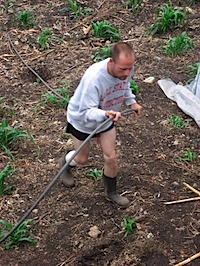 stares. But on one of our runs we came home and remembered we hadn’t put the hose in the greenhouse yet, so Jaime put his rubber boots on and ran to water the garden. I kinda had to take a picture. Unfortunately we are temporarily on a running break because last week Jaime could hardly move due to some intense back pain after helping the family haul firewood and working a bit intensely on the stone steps…or maybe just because he’s getting old? 😉 Then he led Emily and me on a hike this weekend and we got off the known routes and ended up on a steep, narrow path covered in decaying leaves. The hike was pretty and fun until my right leg slid up behind me and my foot twisted until I heard a pop. Then I was sad and in pain, and still had to walk an hour home in a thunderstorm. Now my ankle looks like those of the old ladies in church, minus the greyish black knee-highs and varicose veins. The swelling has gone down a little since Saturday. We lucked out that one of the two tiendas in town just bought a freezer to start selling little homemade popsicles for 25 centavos a piece. Fletch bought 2 quetzales worth and removed all the sticks so I could prop up the ankle and ice it. stares. But on one of our runs we came home and remembered we hadn’t put the hose in the greenhouse yet, so Jaime put his rubber boots on and ran to water the garden. I kinda had to take a picture. Unfortunately we are temporarily on a running break because last week Jaime could hardly move due to some intense back pain after helping the family haul firewood and working a bit intensely on the stone steps…or maybe just because he’s getting old? 😉 Then he led Emily and me on a hike this weekend and we got off the known routes and ended up on a steep, narrow path covered in decaying leaves. The hike was pretty and fun until my right leg slid up behind me and my foot twisted until I heard a pop. Then I was sad and in pain, and still had to walk an hour home in a thunderstorm. Now my ankle looks like those of the old ladies in church, minus the greyish black knee-highs and varicose veins. The swelling has gone down a little since Saturday. We lucked out that one of the two tiendas in town just bought a freezer to start selling little homemade popsicles for 25 centavos a piece. Fletch bought 2 quetzales worth and removed all the sticks so I could prop up the ankle and ice it.
I’ve also managed to start getting up between 6 and 6:30, finally! I hadn’t been able to do this since before we went home for Christmas. You see, everyone here gets up between 5 and 6am, or so  it seems. I feel like I’m hopelessly behind everyone when I get up at 7 or 7:30. The other day I woke up at 6, hopped out of bed, and was pulling on my jeans as I looked out the window and saw Nas out already inspecting his fields. Early to rise, early to bed. I have some trouble with the latter that leads into trouble with the former. Lots of people tend to think, quite mistakenly, that early morning is a good time to come see us. Health President Manuel even told Fletch recently that he doesn’t get up until 7 and all I could think was, “You liar! You come wake us up at 6:30 all the time.” Some women like to bring us hot tortillas or tamales, others come to ask us how much they can get for a pot a relative sent them from the US if they want to sell it here. All these questions could surely wait until later in the morning, but between 6 and 6:30 seems to strike everyone outside of our house as the appropriate time. This monkey’s attitude is a good depiction of how I feel on the inside when these visitors wake me up or invade my early morning peace. I try to keep my cool on the outside, but I’ve found I’m much better at doing that if I’m up, sporting eyewear, dressed and have a hot drink in hand. And on the days that people don’t show up, it’s great to have the quiet time to begin my day. Since the rain is returning, the mornings are pretty moody with all the mist and fog running by outside the window; I like it very much most of the time. Though sometimes I’m a little less than in love with the rain. it seems. I feel like I’m hopelessly behind everyone when I get up at 7 or 7:30. The other day I woke up at 6, hopped out of bed, and was pulling on my jeans as I looked out the window and saw Nas out already inspecting his fields. Early to rise, early to bed. I have some trouble with the latter that leads into trouble with the former. Lots of people tend to think, quite mistakenly, that early morning is a good time to come see us. Health President Manuel even told Fletch recently that he doesn’t get up until 7 and all I could think was, “You liar! You come wake us up at 6:30 all the time.” Some women like to bring us hot tortillas or tamales, others come to ask us how much they can get for a pot a relative sent them from the US if they want to sell it here. All these questions could surely wait until later in the morning, but between 6 and 6:30 seems to strike everyone outside of our house as the appropriate time. This monkey’s attitude is a good depiction of how I feel on the inside when these visitors wake me up or invade my early morning peace. I try to keep my cool on the outside, but I’ve found I’m much better at doing that if I’m up, sporting eyewear, dressed and have a hot drink in hand. And on the days that people don’t show up, it’s great to have the quiet time to begin my day. Since the rain is returning, the mornings are pretty moody with all the mist and fog running by outside the window; I like it very much most of the time. Though sometimes I’m a little less than in love with the rain.
We actually missed the first huge rain storm, which included hail, while we were on a shopping trip in town. We’re big lovers of storms, but this time we came home to find our floor completely soaked under the stove chimney and inside the stove all the great ash and coal we’d built up over weeks of burning (it helps the stove run super efficiently) was also soaked. The rain had come in the joints on the chimney and leaked down the inside, and run down the outside of the pipe and in through the hold in the wall, thus the wet floor. We were both sad and upset and stressed out. Trips in to town sap our energy faster than most things, so we want to come home to our quiet and relatively comfy house and find peace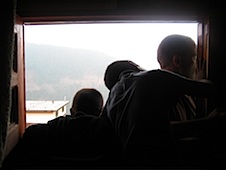 . The whole mess made us very upset. But luckily, I decided to bring my very own Eagle Scout/ Mr. Fixit as a consultant with me here to Peace Corps, and we figured out a plan of action–though the plan required the rain to stop and another trip in to town. Even luckier, that day we’d stopped by the post office and picked up Fletch’s birthday package from his parents. The contents cheered us greatly, and after fixing some tea we were less stressed. Now we have a mini-gutter diverting rain off the chimney and lots of silicon sealing in the chimney joints and the hole in wall. We no longer have a wet floor during the heavy rain storms. Yay. The picture is of Fletch hanging out our window fixing the chimney with his trusty sidekicks, Chaly and Alberto, checking his handy work. I have a lot of picture of these three crew-cut heads together in various situations; they crack me up. . The whole mess made us very upset. But luckily, I decided to bring my very own Eagle Scout/ Mr. Fixit as a consultant with me here to Peace Corps, and we figured out a plan of action–though the plan required the rain to stop and another trip in to town. Even luckier, that day we’d stopped by the post office and picked up Fletch’s birthday package from his parents. The contents cheered us greatly, and after fixing some tea we were less stressed. Now we have a mini-gutter diverting rain off the chimney and lots of silicon sealing in the chimney joints and the hole in wall. We no longer have a wet floor during the heavy rain storms. Yay. The picture is of Fletch hanging out our window fixing the chimney with his trusty sidekicks, Chaly and Alberto, checking his handy work. I have a lot of picture of these three crew-cut heads together in various situations; they crack me up.
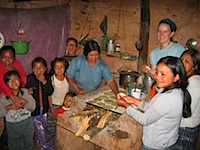 Our regular work is going well–Yulais invites us to eat with them after almost every charla. There are certain things we do that are always entertaining to them, putting on a traje is hilarious no matter how many times they see it, as is my attempting to tortillear, or make tortillas. It does look a lot easier than it is. I manage to make tortillas, but they are malformed and uneven, with thick and thin spots that make them break when someone flips them on the plancha. But we do take it (very seriously) as part of our job here just to be entertaining. And you will note from the kid in the background that our policy of serious entertainment is sometimes contagious. And yes, the two girls standing in front of me are the girls who tried to get scholarships from us earlier. We’re still working with them a lot, and I think it’s good for everyone, especially their community, as our health talks would be much less useful without their translation. Last week one was sick and the other absent so we had a guy translate for us, and I realized just how much energy the two of them bring with their translating. The other guy had a smile on his face the whole time he talked, but he sure spoke slowly and nervously. It changed the whole tone of the presentation. So, in spite of the bad deal with the scholarships, things are going pretty well with us and them. Our regular work is going well–Yulais invites us to eat with them after almost every charla. There are certain things we do that are always entertaining to them, putting on a traje is hilarious no matter how many times they see it, as is my attempting to tortillear, or make tortillas. It does look a lot easier than it is. I manage to make tortillas, but they are malformed and uneven, with thick and thin spots that make them break when someone flips them on the plancha. But we do take it (very seriously) as part of our job here just to be entertaining. And you will note from the kid in the background that our policy of serious entertainment is sometimes contagious. And yes, the two girls standing in front of me are the girls who tried to get scholarships from us earlier. We’re still working with them a lot, and I think it’s good for everyone, especially their community, as our health talks would be much less useful without their translation. Last week one was sick and the other absent so we had a guy translate for us, and I realized just how much energy the two of them bring with their translating. The other guy had a smile on his face the whole time he talked, but he sure spoke slowly and nervously. It changed the whole tone of the presentation. So, in spite of the bad deal with the scholarships, things are going pretty well with us and them.
Finally, while spending this last month at home we quietly passed our one year in country mark. Neither one of us can believe it’s gone so quickly. I feel like we can see the end of our service looming before us. What’s really strange though, is to remember how, a year ago, we knew neither the village, the family, or the community members we now consider friends and extended family. It feels like we’ve got so much work to do, and so little time. Wish us luck! And, as always, we miss you guys.
Posted by: emily
|
|
|
 When I signed up to come to Peace Corps, it was with the understanding that I’d get to put my skills to use. I’m an architect, I like to build stuff. When we got assigned to Rural Home Preventive Health, I understood that we’d be building sanitary infrastructure and teaching about health topics related to that. Unfortunately for me, they redesigned the program right before we arrived… going from 80% construction and 20% education, to our new approach of 10% construction and 90% education. The reasoning is sound; if people don’t understand how the technology works, they won’t know how to maintain it, or build their own…hell, they won’t even care that they have it.
When I signed up to come to Peace Corps, it was with the understanding that I’d get to put my skills to use. I’m an architect, I like to build stuff. When we got assigned to Rural Home Preventive Health, I understood that we’d be building sanitary infrastructure and teaching about health topics related to that. Unfortunately for me, they redesigned the program right before we arrived… going from 80% construction and 20% education, to our new approach of 10% construction and 90% education. The reasoning is sound; if people don’t understand how the technology works, they won’t know how to maintain it, or build their own…hell, they won’t even care that they have it.  Because of this, there are a lot of latrines in our valley that are now chicken coops or tool sheds, because it’s more convenient to poop in the fields and they don’t realize that it might make them sick in the long run. Nonetheless, I was less than thrilled at not getting to build much. But now that we’ve been in our site a while, I am starting to get rolling on more construction projects.
Because of this, there are a lot of latrines in our valley that are now chicken coops or tool sheds, because it’s more convenient to poop in the fields and they don’t realize that it might make them sick in the long run. Nonetheless, I was less than thrilled at not getting to build much. But now that we’ve been in our site a while, I am starting to get rolling on more construction projects. Boy was I suprised a few days ago, when he came by my house and said, “OK, I have the stuff. Are you ready to start tomorrow?” This is the GOOD kind of suprise, though, so I cleared my schedule and we started on Friday with the concrete base. You see, he wanted the Cadillac of latrines. We do two types here: one is basically a hole in the ground, but sealed with a concrete pad and vent tube. It keeps the flies from moving in and out with their cargo of disease. But it fills up in 5 or 6 years, and has to be moved to a new hole.
Boy was I suprised a few days ago, when he came by my house and said, “OK, I have the stuff. Are you ready to start tomorrow?” This is the GOOD kind of suprise, though, so I cleared my schedule and we started on Friday with the concrete base. You see, he wanted the Cadillac of latrines. We do two types here: one is basically a hole in the ground, but sealed with a concrete pad and vent tube. It keeps the flies from moving in and out with their cargo of disease. But it fills up in 5 or 6 years, and has to be moved to a new hole.  Saturday we laid the blocks around the composting box. “Do we need to hire a mason?” is the question they always ask. Um, no… we’re building a shithouse, folks. It needs to be tight, strong, level- but doesn’t have to look professional. I can do that, and I can show them how to do that. Emily came by to help on Saturday; it always amuses them to see a woman building anything. Today we plastered the inside of the composting chambers, and later in the week we are going to make the formwork and pour the upper concrete slab. I will post pictures as things develop.
Saturday we laid the blocks around the composting box. “Do we need to hire a mason?” is the question they always ask. Um, no… we’re building a shithouse, folks. It needs to be tight, strong, level- but doesn’t have to look professional. I can do that, and I can show them how to do that. Emily came by to help on Saturday; it always amuses them to see a woman building anything. Today we plastered the inside of the composting chambers, and later in the week we are going to make the formwork and pour the upper concrete slab. I will post pictures as things develop. For those of you at home who are interested, I want to do more latrine projects. I have already received a pledge from US Architects to sponsor one. My plan is to use whatever donations I can get to offset half the cost of materials for anyone in our village who wishes to make their home healthier with a “proper” latrine. Then, we will build it together. If any of you readers (or any of your friends/ relatives/ coworkers) are interested in sponsoring a sanitary latrine in Guatemala, email me at jfanjoy@hiddentower.com. Total material cost for a latrine is about $300, so by donating $150 you or your loved ones can help a Mayan family to help themselves. I will even get you pictures of your sponsored family.
For those of you at home who are interested, I want to do more latrine projects. I have already received a pledge from US Architects to sponsor one. My plan is to use whatever donations I can get to offset half the cost of materials for anyone in our village who wishes to make their home healthier with a “proper” latrine. Then, we will build it together. If any of you readers (or any of your friends/ relatives/ coworkers) are interested in sponsoring a sanitary latrine in Guatemala, email me at jfanjoy@hiddentower.com. Total material cost for a latrine is about $300, so by donating $150 you or your loved ones can help a Mayan family to help themselves. I will even get you pictures of your sponsored family.





 The Peace Corps is invited by governments in need, to provide aid, and we are often sent to places that are “less than stable” politically. Since it’s inception in 1961, the Peace Corps has struggled with the danger of its volunteers being suspected of espionage. The Peace Corps works to dispell that image, for example, by barring anyone who ever worked for the CIA in any from Peace Corps service. For life. Government employees in other branches that might conflict are made aware of the situation as well, and are specifically trained not to solicit information from Peace Corps volunteers. This even trickles down to our daily lives: we can’t wear old fatigues, for instance, because that might imply a relationship with the military.
The Peace Corps is invited by governments in need, to provide aid, and we are often sent to places that are “less than stable” politically. Since it’s inception in 1961, the Peace Corps has struggled with the danger of its volunteers being suspected of espionage. The Peace Corps works to dispell that image, for example, by barring anyone who ever worked for the CIA in any from Peace Corps service. For life. Government employees in other branches that might conflict are made aware of the situation as well, and are specifically trained not to solicit information from Peace Corps volunteers. This even trickles down to our daily lives: we can’t wear old fatigues, for instance, because that might imply a relationship with the military. 



 The closest “city” to where we live is the departmental capitol, Huehuetenango. We joke that it’s like Dodge City in the wild west days- when you get to the dusty bus terminal, it’s a carnival of people, livestock, stagecoaches (ok, buses) and it always feels like a gunslinger is going to call someone out. They have a
The closest “city” to where we live is the departmental capitol, Huehuetenango. We joke that it’s like Dodge City in the wild west days- when you get to the dusty bus terminal, it’s a carnival of people, livestock, stagecoaches (ok, buses) and it always feels like a gunslinger is going to call someone out. They have a 




